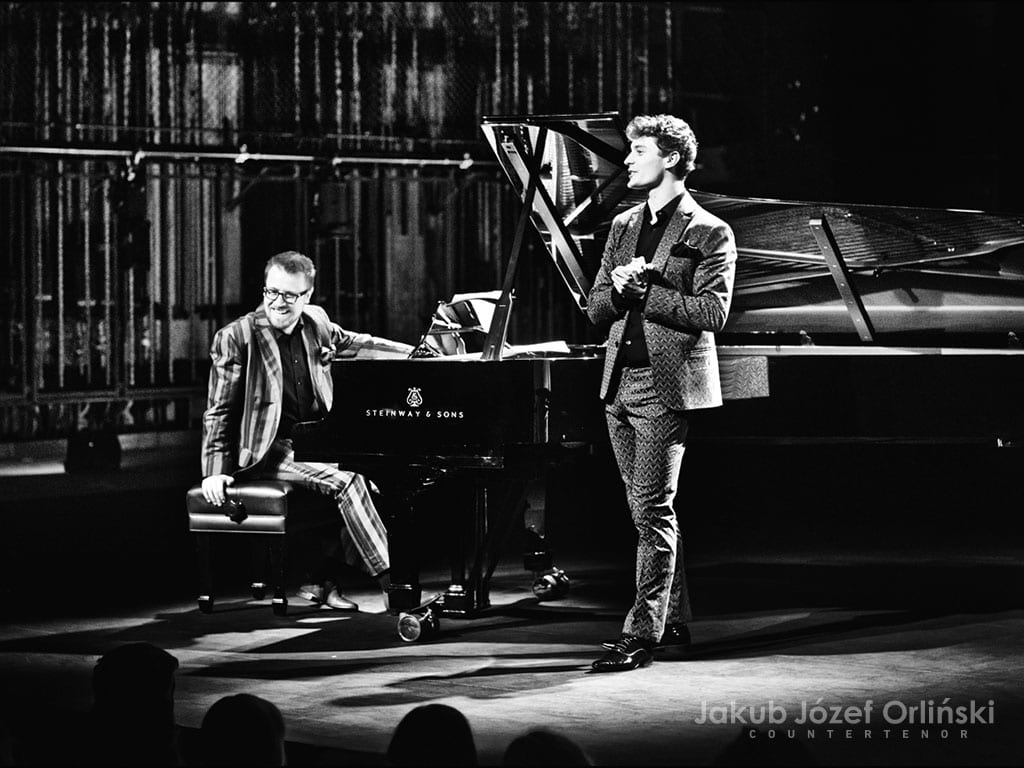A Review by Marek Zebrowski
Jakub Józef Orliński, the internationally-acclaimed countertenor, presented a solo recital at the Eli and Edythe Broad Stage in Santa Monica on March 10. The capacity crowd warmly welcomed the soloist and his pianist, Michał Biel, as they quickly took charge of the stage in their only Los Angeles appearance.
Their program began with a contemplative (and little known) song, Non t’amo per il ciel by Johann Joseph Fux (1660-1741). This introduction gave Orliński and Biel a chance to get a sense of the space, as well as a perfect opportunity to launch into several songs by Henry Purcell (1659-1695), including Music for a While, I Love You Not, Fairest Isle, The Cold Song, and Strike the Viol, with thoroughly admirable and highly infectious gusto.
Listening to a countertenor and Baroque repertoire is no surprise, but what followed certainly amounted to a big one. In one fell swoop (or whiplash), the audience was propelled three centuries forward to a world premiere performance of three songs by Henryk Czyż (1923-2003), one of the distinguished contemporary Polish conductors whose musical compositions only recently began to appear on stage. Written to texts by Alexander Pushkin and poetically translated into the Polish by Julian Tuwim, the tender lyrics about unattained love found a lovely echo in Czyż’s late romantic melodic and harmonic language. The effect of Orliński’s vocal volte-face was quite stunning and pleasing, adding new aural dimensions to this unexplored repertoire.
The same electric effect was present—and felt even more intensely—in the selection of songs from Op. 1 and Op. 3 by Mieczysław Karłowicz (1876-1909) heard directly after the intermission. Although much better known than Czyż, this repertoire is also virgin countertenor territory and Orliński’s brave appropriation of it added a whole new emotional horizon to such songs as Nie płacz nade mną, Z Erotyków, Mów do mnie jeszcze, Śpi w blaskach nocy, Przed nocą wieczną, Na spokojnym ciemnym morzu, W wieczorną ciszę, Smutna jest dusza moja, Skąd pierwsze gwiazdy, Czasem gdy długo na pół sennie marzę, and Zaczarowana królewna.
The Karłowicz set of brief but intensely felt songs was rewarded with a prolonged standing ovation by the audience. Clearly delighted with the reception, as soon as the house calmed down Orliński disarmingly announced that this actually wasn’t the end of the program and more Polish music is still on offer with “some Moniuszko.” And so it was. Stanisław Moniuszko (1819-1872) is a composer rightly admired for the rich catalogue of his Schubertian-styled lieder, and on this occasion Orliński presented two songs from the Śpiewnik domowy [Songbooks for Home Use] albums—O łzo samotna and Prząśniczka—which once more brought the house down. Moniuszko wasn’t intended as the final number because once again Orliński returned to the Baroque era. With a thoughtful and appropriate choice, he closed his Santa Monica recital with Amen, Alleluia by George Frederic Handel (1685-1759).
The program now over, the enthusiastic audience was nonetheless able to demand from the artists three more encores. They were dispatched with much charm, elegance and grace as well as a little bit of cheek, as elements of modern choreography were added to the soloist’s spotless delivery. Throughout the entire recital, Orliński’s deep musicianship, admirable coloratura, impeccable ornamentation and keen sense of style made for a very satisfying listening experience. Mixing styles and presenting a substantial selection of Polish repertoire certainly pleased many of Orliński’s compatriots who flocked to hear him.
Pianist Michał Biel excelled throughout the highly-varied program by providing colorful, highly controlled and ideally timed support for every phrase, breath, and dynamic level. Collaboration on such high artistic level between these two artists gave the evening a rare quality of an event that will be remembered for a very long time.
[Source: Photo by Honorata Karapuda via jakubjozeforlinski.com]
